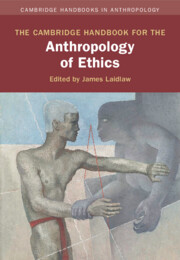Book contents
- The Cambridge Handbook for the Anthropology of Ethics
- Cambridge Handbooks in Anthropology
- The Cambridge Handbook for the Anthropology of Ethics
- Copyright page
- Contents
- Contributors
- 1 Introduction
- Part I Intellectual Sources and Disciplinary Engagements
- Part II Aspects of Ethical Agency
- 9 Making the Ethical in Social Interaction
- 10 Freedom
- 11 Responsibility
- 12 Emotion and Affect
- 13 Happiness and Well-Being
- 14 Suffering and Sympathy
- 15 Ambiguity and Difference
- Part III Media and Modes of Ethical Practice
- Part IV Intimate and Everyday Life
- Part V Institutional Life
- Index
- References
10 - Freedom
from Part II - Aspects of Ethical Agency
Published online by Cambridge University Press: 11 May 2023
- The Cambridge Handbook for the Anthropology of Ethics
- Cambridge Handbooks in Anthropology
- The Cambridge Handbook for the Anthropology of Ethics
- Copyright page
- Contents
- Contributors
- 1 Introduction
- Part I Intellectual Sources and Disciplinary Engagements
- Part II Aspects of Ethical Agency
- 9 Making the Ethical in Social Interaction
- 10 Freedom
- 11 Responsibility
- 12 Emotion and Affect
- 13 Happiness and Well-Being
- 14 Suffering and Sympathy
- 15 Ambiguity and Difference
- Part III Media and Modes of Ethical Practice
- Part IV Intimate and Everyday Life
- Part V Institutional Life
- Index
- References
Summary
The concept of freedom has been relatively neglected in anthropology. This chapter explores why and argues that freedom, especially when placed in tandem with care, is crucial for an anthropology of ethics, which is not focussed on rule-based morality but rather on the ways in which people work out what constitutes a life worth living and how to lead it. It makes this case both by drawing on emic invocations of freedom which often incorporate social critique and by analysing individual ethical choices via a family of concepts, which includes freedom, regard, care, and responsibility. This liberates ‘freedom’ from its associations with both individual autonomy and radical change, and enables us to focus more on its relational dimensions. If we think about ethical projects as attempts to move from an existing situation identified as unsatisfactory to a situation identified, on reflection, as better or good, we can see that an anthropology of ethics does not have to be confined to individual projects or religious projects of transcendence, but can take on board political projects of critique and transformation. We can then ask how people exercise the freedom or create the social conditions necessary to enact these projects.
- Type
- Chapter
- Information
- The Cambridge Handbook for the Anthropology of Ethics , pp. 251 - 280Publisher: Cambridge University PressPrint publication year: 2023



